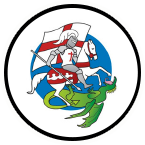Humanities (ID 1024)
-
Other Subjects
-
Humanities Links
Humanities Links

At St. George's, we believe that geography helps to inspire children's fascination about the world and its people which will remain with them throughout their lives. Our aims are to encourage children to think deeply about interactions between physical and human processes, and of the formation and use of landscapes and environments, both on a global scale, and within their locality.
Being a geographer at St. George's Primary School means:
Learning about our world, children investigate different places starting at their locality and the United Kingdom before they travel further afield to look at places in Europe, North and South America, Asia and even the weather extremes of the north and south poles and the equator.
Being skilled at using maps, globes and other sources is fundamental for children to learn about places around the world and their different geographical features.
Understanding the impact we have on our world allows children to appreciate our world in a different light.
Being investigative allows children to explore different areas and collect information and data on geographical features, weather and how people live (traffic use, number of residents etc). Through use of outdoor learning boxes, children can venture outdoors for a more 'hands-on' experience.

Being knowledgeable about our world allows children to understand and navigate the globe from a position of strength. By the time our children leave school, they should:
- know the names of the 7 continents and 5 oceans of the world.
- know the important geographical places and features in the United Kingdom.
- know the main countries of Europe, the important cities, rivers and mountain ranges.
- know the equator, the Northern and Southern Hemispheres and other geographical features.
- know the dangers of climate change and the threat this poses to our environment.
- learn about another country in detail.
.jpg)
Inclusive practice:
We have the highest ambition for all of our children. Through inclusive practice, needs of all will be supported to develop their geographical knowledge and skills.
An inclusive approach to education means that each individual learner is valued and that they are treated with dignity and respect.
In an inclusive classroom, teachers are aware of the diversity of students and work with them to create a safe and collaborative learning environment.
We will teach our children to describe geography as:
EYFS and KS1 - learning about where they live, including places around our school and grounds.
Years 3 and 4 - learning about the wider world around them - how some countries have differences and similarities to us.
Years 5 and 6 - the human and physical features in the wider world.
Key essential skills:
- using and understanding globes, atlases, maps, photographs and other sources of geographical information.
- undertaking fieldwork so one can experience the differences between human and physical geography, e.g. collating a traffic survey, building models of towns, collecting photographs, recording weather patterns, measuring river depth, conducting a street or town survey.
- identifying and describing climate and weather patterns, physical features and processes (e.g. glaciers, rivers, coasts), human features and processes (e.g. settlement patterns, exploring what towns and villages are like etc)
- understanding and use a wide range of subject-specific geographical vocabulary.
We learn geography because it enables us to develop a deeper understanding of the world around us and ask key geographical questions such as:
- Where is this place? Why are we learning about it?
- What is it like and why is it like that? How and why is it changing?
- How does this place compare with other places?
- How and why are places around the world connected?
- How can I investigate this place?
- How can I use my geographical skills to communicate information about this place?

Promoting RESPECT:
Resilience: How resilient do people, animals, plants have to be to survive in other parts of the world? What does human geography teach us about resilience of the Earth's environment?
Empathy: What is it like to live in other parts of the world? Can we empathise with areas that have their way of life threatened by geographical and environmental factors (coastal erosion, pollution, earthquakes etc)?
Self-Awareness: How self-aware are people about their environment and how geography affects their lives? Are we environmentally self-aware and responsible?
Positivity: How have we adapted to our geography to improve quality of life? Examples include irrigation, using volcanoes as fertile soil, solar power near the equator etc.
Excellence: Who are the pioneers in geography? How have they excelled in their field?
Communication and Teamwork: How do we use communication and teamwork for mapping, orientation, fieldwork etc?
Files to Download
-
Geography Curriculum Statement
download_for_offline
↑
download_for_offlineGeography Curriculum Statement
- Geography Long Term Sequencing download_for_offline
download_for_offlineGeography Long Term Sequencing
- Geography Progression of Skills download_for_offline
download_for_offlineGeography Progression of Skills
- Geography Road Map download_for_offline
download_for_offlineGeography Road Map
- Geography Long Term Sequencing download_for_offline


